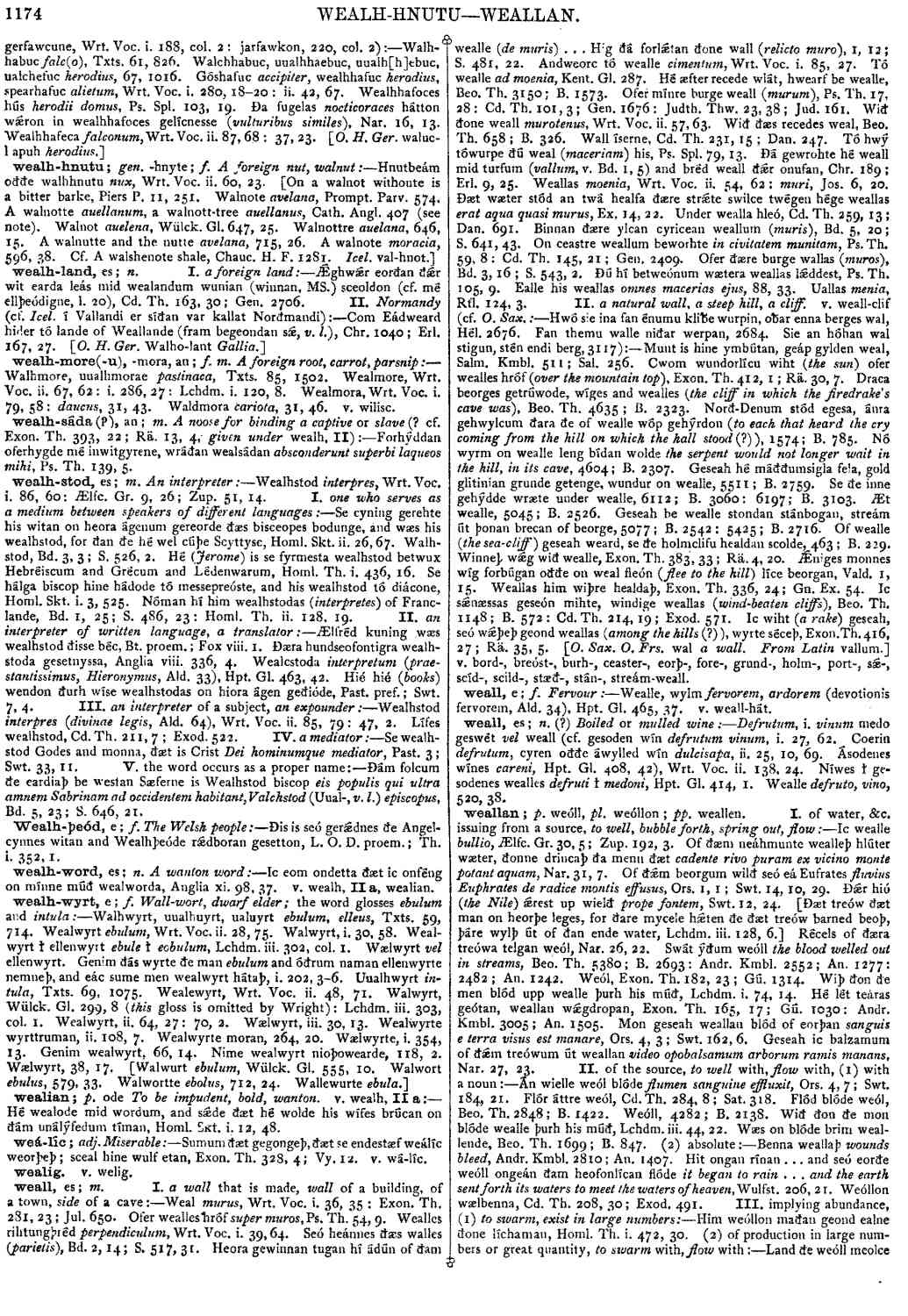weall
- noun [ masculine ]
-
Weal
murus,
- Wrt. Voc. i. 36, 35: Exon. Th. 281, 23; Jul. 650.
-
Ofer wealles hróf
super muros
,- Ps. Th. 54, 9.
-
Wealles rihtungþréd
perpendiculum,
- Wrt. Voc. i. 39, 64.
-
Seó heánnes ðæs walles (
parietis
),- Bd. 2, 14; S. 517, 31.
-
Heora gewinnan tugan hí ádún of ðam wealle (
de muris) . . . Hig ðá forlǽtan ðone wall (relicto muro ),
- 1, 12; S. 481, 22.
-
Andweorc tó wealle
cimentum,
- Wrt. Voc. i. 85, 27.
-
Tó wealle
ad moenia,
- Kent. Gl. 287.
-
Hé æfter recede wlát, hwearf be wealle,
- Beo. Th. 3150; B. 1573.
-
Ofer mínre burge weall (
murum
),- Ps. Th. 17, 28: Cd. Th. 101, 3; Gen. 1676: Judth. Thw. 23, 38; Jud. 161.
-
Wið ðone weall
murotenus,
- Wrt. Voc. ii. 57, 63.
-
Wið ðæs recedes weal,
- Beo. Th. 658; B. 326.
-
Wall íserne,
- Cd. Th. 231, 15; Dan. 247.
-
Tó hwý tówurpe ðú weal (
maceriam
) his,- Ps. Spl. 79, 13.
-
Ðá gewrohte hé weall mid turfum (
vallum,
v.- Bd. 1, 5)
-
Weallas moenia, Wrt. Voc. ii. 54, 62:
muri,
- Jos. 6, 20.
-
Ðæt wæter stód an twá healfa ðære strǽte swilce twégen hége weallas
erat aqua quasi murus,
- Ex. 14, 22.
-
Under wealla hleó,
- Cd. Th. 259, 13; Dan. 691.
-
Binnan ðære ylcan cyricean weallum (
muris
),- Bd. 5, 20; S. 641, 43.
-
On ceastre weallum beworhte
in civitatem munitam,
- Ps. Th. 59, 8: Cd. Th. 145, 21; Gen. 2409.
-
Ofer ðære burge wallas (
muros
),- Bd. 3, 16; S. 543, 2.
-
Ðú hí betweónum wætera weallas lǽddest,
- Ps. Th. 105, 9.
-
Ealle his weallas
omnes macerias ejus,
- 88, 33.
-
Uallas
menia,
- Rtl. 124, 3.
-
Hwó sie ina fan énumu kliƀe wurpin, oƀar enna berges wal,
- Hél. 2676.
- Fan themu walle niðar werpan, 2684.
-
Sie an hóhan wal stigun, stén endi berg, 3117) :-- Munt is hine ymbútan, geáp gylden weal,
- Salm. Kmbl. 511; Sal. 256.
-
Cwom wundorlícu wiht (
the sun) ofer wealles hróf (over the mountain top ),
- Exon. Th. 412, 1; Rä. 30, 7.
-
Draca beorges getrúwode, wíges and wealles (
the cliff in which the firedrake's cave was
),- Beo. Th. 4635; B. 2323.
-
Norð-Denum stód egesa, ánra gehwylcum ðara ðe of wealle wóp gehýrdon (
to each that heard the cry coming from the hill on which the hall stood
(?)),- 1574; B. 785.
-
Nó wyrm on wealle leng bídan wolde
the serpent would not longer wait in the hill, in its cave,
- 4604; B. 2307.
-
Geseah hé máððumsigla fela, gold glitinian grunde getenge, wundur on wealle,
- 5511; B. 2759.
-
Se ðe inne gehýdde wræte under wealle,
- 6112; B. 3060: 6197; B. 3103.
-
Æt wealle,
- 5045; B. 2526.
-
Geseah be wealle stondan stánbogan, streám út þonan brecan of beorge,
- 5077; B. 2542: 5425; B. 2716.
-
Of wealle (
the sea-cliff
) geseah weard, se ðe holmclifu healdan scolde,- 463; B. 229.
-
Winneþ wǽg wið wealle,
- Exon. Th. 383, 33; Rä. 4, 20.
-
Ǽniges monnes wíg forbúgan oððe on weal fleón (
flee to the hill
) líce beorgan,- Vald. 1, 15.
-
Weallas him wiþre healdaþ,
- Exon. Th. 336, 24; Gn. Ex. 54.
-
Ic sǽnæssas geseón mihte, windige weallas (
wind-beaten cliffs
),- Beo. Th. 1148; B. 572: Cd. Th. 214, 19; Exod. 571.
-
Ic wiht (a rake) geseah, seó wǽþeþ geond weallas (
among the hills
(?)), wyrte séceþ,- Exon. Th. 416, 27; Rä. 35, 5.
Bosworth, Joseph. “weall.” In An Anglo-Saxon Dictionary Online, edited by Thomas Northcote Toller, Christ Sean, and Ondřej Tichy. Prague: Faculty of Arts, Charles University, 2014. https://bosworthtoller.com/34788.
Checked: 0